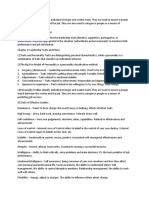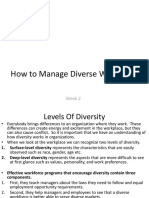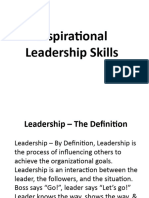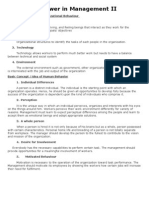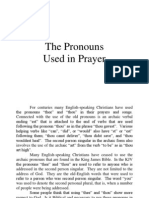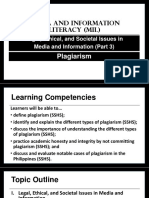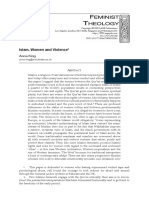Group 12: Attitudes, Values, Ethics, and Culture: The Manager As A Person
Group 12: Attitudes, Values, Ethics, and Culture: The Manager As A Person
Uploaded by
Beberly VerinaCopyright:
Available Formats
Group 12: Attitudes, Values, Ethics, and Culture: The Manager As A Person
Group 12: Attitudes, Values, Ethics, and Culture: The Manager As A Person
Uploaded by
Beberly VerinaOriginal Title
Copyright
Available Formats
Share this document
Did you find this document useful?
Is this content inappropriate?
Copyright:
Available Formats
Group 12: Attitudes, Values, Ethics, and Culture: The Manager As A Person
Group 12: Attitudes, Values, Ethics, and Culture: The Manager As A Person
Uploaded by
Beberly VerinaCopyright:
Available Formats
Group 12 Attitudes, Values, Ethics, and Culture: The Manager as a Person
Personality Traits Enduring tendencies to feel, think, and act in certain ways Characteristics that influence how people think, feel and behave on and off the job The personalities of managers account for the different approaches that managers adopt to management. Traits are viewed as a continuum (from high to low) along which individuals fall.
The Big Five Personality Traits Extroversion
The tendency to experience positive emotions and moods and to feel good about oneself and the rest of the world. -managers high on this trait are sociable and friendly. Negative Affectivity
The tendency to experience negative emotions and moods, to feel distressed, and to be critical of oneself and others. -managers high on this trait are often critical and feel angry with others and themselves. Agreeableness The tendency to get along well with other people. -managers high on this trait are likable, and care about others. Conscientiousness The tendency to be careful, scrupulous, and persevering -managers high on this trait are organized and self- disciplined Openness to Experience
The tendency to be original, have broad interests, to be open to a wide range of stimuli, be daring, and take risks -managers who are high on this trait may be especially likely to take risks and be innovative on their planning and decision making
Other Personality Traits that Affect Managerial Behavior Internal Locus of Control
The tendency to locate responsibility for ones own fate within oneself. People believe they are responsible for their fate and see their actions as important to achieving goals. -some managers with an internal locus of control see the success of the whole organization resting on their shoulders External Locus of Control
The tendency to locate responsibility for ones fate within outside forces and to believe that ones own behavior has little impact on outcomes. People believe external forces decide their fate and their actions make little difference. As such, they tend not to intervene to try to change a situation or solve a problem, leaving it to someone else. Self-Esteem
The degree to which people feel good about themselves and their abilities. High self-esteem causes a person to feel competent, and capable. Persons with low selfesteem have poor opinions of themselves and their abilities. Need for Achievement
The extent to which an individual has a strong desire to perform challenging tasks well and meet personal standards for excellence. People with a high need for achievement often set clear goals for themselves and like to receive performance feedback. Need for Affiliation
The extent to which an individual is concerned about establishing and maintaining good interpersonal relations, being liked, and having other people get along. Need for Power The extent to which an individual desires to control or influence others.
Values These are beliefs that guide our behavior. Values makes us accept things and reject others. This also describe what managers try to achieve through work and how they think they should behave. Two Types of Personal Values Terminal Values - a personal conviction about life-long goals and objectives that an individual seeks to achieve. Ex. sense of accomplishment, equality, and self respect Instrumental Values - a personal conviction about desired modes of conduct that an individual seeks to follow. Ex. hardworking, honest, logical Attitudes An attitude is a collection of feelings and beliefs. Attitudes are also the manifestation of our values. It is the way how we show our thoughts and feelings to others. Job Satisfaction -a collection of feelings and beliefs that managers have about their current jobs. Managers high on job satisfaction have a positive view of their jobs. -levels of job satisfaction tend increase as managers move up in the hierarchy in an organization. Organizational Citizenship Behaviors -behaviors that are not required of organizational members but that help the firm in gaining a competitive advantage. Managers with high satisfaction are more likely to perform these above and beyond the call of duty behaviors like putting extra hours to finish their work. Likewise, managers who are satisfied with their jobs are less likely to quit. Organizational Commitment -The collection of feelings and beliefs that managers have about their organization as a whole. Committed managers are loyal to and are proud of their firms. This commitment can lead to a strong organizational culture. Organizational commitment can help managers to perform some of their figurehead and spokesperson roles.
Mood A feeling or state of mind. Moods differ from emotions in that they are less intense. Positive moods- provide excitement, elation, and enthusiasm. Negative moods- lead to fear, distress, and nervousness.
Emotions Another kind of feeling state that is more intense than moods. Emotional Intelligence The ability to understand and manage ones own moods and emotions and the moods and emotions of other people. Managers with high level of emotional intelligence are more likely to understand how they are feeling and why, and are more able to effectively manage their feelings.
Ethics Moral principles or beliefs about what is right or wrong. Ethics guide managers in their dealings with stakeholders and others when the best course of action is unclear. Ethical Decision Models Utilitarian Model -An ethical decision is one that produces the greatest good for the greatest number of people. Moral Rights Model -An ethical decision is one that best maintains and protects the fundamental rights and privileges of the people affected by it. Justice Model -An ethical decision is one that distributes benefits and harms among stakeholders in a fair, equitable, or impartial way.
Ethical versus Unethical Decisions Ethical Decision -A decision that is reasonable or typical stakeholders would find acceptable because it aids stakeholders, the organization, or society.
Unethical Decision -A decision that a manager would prefer to disguise or hide from other people because it enables the company or a particular individual to gain at the expense of society or other stakeholders.
Sources of An Organizations Code of Ethics Societal Ethics -Standards that govern how members of a society are to deal with each other on ethical issues -Based on values and standards found in societys legal rules, norm, and mores Professional ethics -Standards that govern how members of a profession are to make decision when the way they should behave is not clear-cut -the values and standards that managers and workers use to decide how to behave appropriately Individual ethics -Personal standards that govern how individuals are to interact with other people -Influenced by family, upbringing in general, and life experiences
You might also like
- Wendy Goldman - Women, The State & Revolution. Soviet Family Police & Social Life, 1917-1936Document367 pagesWendy Goldman - Women, The State & Revolution. Soviet Family Police & Social Life, 1917-1936Rayza Sarmento100% (2)
- Joan-Org. & MNGMNT 8Document3 pagesJoan-Org. & MNGMNT 8Marinay Joan, A.No ratings yet
- Chapter2 PresentationDocument43 pagesChapter2 PresentationYeshitilaNo ratings yet
- Leadership Got Prv 1Document8 pagesLeadership Got Prv 1Lumoya, Hazzel Mae M.No ratings yet
- Supervision in Hospitality PPT 5Document24 pagesSupervision in Hospitality PPT 5Liam LivingstoneNo ratings yet
- LeadershipDocument22 pagesLeadershipSaad AhmedNo ratings yet
- Ethical Decision Making and Ethical LeadershipDocument11 pagesEthical Decision Making and Ethical LeadershipmisonotoNo ratings yet
- Notes On Unit 4 OBSDocument3 pagesNotes On Unit 4 OBSAlessia GaleottiNo ratings yet
- Mi Lec. 6Document7 pagesMi Lec. 6boombasticmr134No ratings yet
- GM - Chapter 14Document34 pagesGM - Chapter 14Phyo Aung HeinNo ratings yet
- Answer To The Question No 2: Desire For Involvement-Many Employees Actively Seek Opportunities at Work To BecomeDocument7 pagesAnswer To The Question No 2: Desire For Involvement-Many Employees Actively Seek Opportunities at Work To BecomeshuvoNo ratings yet
- Mgt. 200 Exam 1 ReviewDocument12 pagesMgt. 200 Exam 1 Reviewlauren.minhinnettNo ratings yet
- Leadership - Big Five ModelDocument4 pagesLeadership - Big Five ModelGiorgi ShulaiaNo ratings yet
- Values, Attitudes, Emotions, and Culture The Manager As A PersonDocument14 pagesValues, Attitudes, Emotions, and Culture The Manager As A PersonaldianRiNo ratings yet
- MNO1001X Cheat SheetDocument8 pagesMNO1001X Cheat SheetYin HauNo ratings yet
- Chapter 2 Values Attitude Emotions and Culture The Manager As PersonDocument15 pagesChapter 2 Values Attitude Emotions and Culture The Manager As PersonMarisse Bagalay TejamoNo ratings yet
- Attitude: Nature of AttitudesDocument8 pagesAttitude: Nature of AttitudesDibyaranjan SahooNo ratings yet
- HBO ValuesAttitudes and Job SatisfactionDocument8 pagesHBO ValuesAttitudes and Job Satisfactionpirits11No ratings yet
- Social Influence Group Leadership and FollowershipDocument25 pagesSocial Influence Group Leadership and Followershipneya MantosNo ratings yet
- Chapter 7Document49 pagesChapter 7lthien0901No ratings yet
- LECTURE 3 MayDocument26 pagesLECTURE 3 Mayaymoon.abdulrahimNo ratings yet
- ATTITUDE (Revised)Document32 pagesATTITUDE (Revised)Sagar SamantaraNo ratings yet
- Chapter 15 Individual BehaviorDocument9 pagesChapter 15 Individual Behaviorsnap7678650No ratings yet
- Sports Management Leadership NotesDocument9 pagesSports Management Leadership Notesjassyxo4112No ratings yet
- Business Ethics Session 6Document28 pagesBusiness Ethics Session 6EliaQazilbashNo ratings yet
- DirectingDocument37 pagesDirectingMadhusudanNo ratings yet
- Mod 4 and 5Document33 pagesMod 4 and 5Rennejarek BenitezNo ratings yet
- Influences On Employee Behavior HRD Slide Set 1Document53 pagesInfluences On Employee Behavior HRD Slide Set 1Asad JuttNo ratings yet
- Organizational BehaviourDocument5 pagesOrganizational BehaviourSandesh ThapaNo ratings yet
- Leadership Traits and EthicsDocument17 pagesLeadership Traits and EthicsGiorgi ShulaiaNo ratings yet
- MNO Chapter 11 - Managing Individual Differences & BehaviorDocument11 pagesMNO Chapter 11 - Managing Individual Differences & BehaviorDouglas Fong100% (5)
- Leadership ManagementDocument5 pagesLeadership Managementbannaswag246No ratings yet
- Soft Skills Unit 3Document13 pagesSoft Skills Unit 3Kushagra SrivastavaNo ratings yet
- Entrepreneurial Mind (Pre Review)Document11 pagesEntrepreneurial Mind (Pre Review)Macy Alejo BuendiaNo ratings yet
- Organizational Behavior Shukri UMDocument46 pagesOrganizational Behavior Shukri UMEddy JohariNo ratings yet
- Question Bank OB1Document12 pagesQuestion Bank OB1mohammed31310No ratings yet
- EMS Leadership For New EMTsDocument53 pagesEMS Leadership For New EMTsBethuel Aliwa100% (1)
- OB NotesDocument56 pagesOB NotesAnkur Nagwan89% (9)
- ORGANIZATIONDocument28 pagesORGANIZATIONSharmaine Paragas FaustinoNo ratings yet
- Inspirational Leadership SkillsDocument36 pagesInspirational Leadership SkillsMoljibok DanielNo ratings yet
- MoraleDocument21 pagesMoralemaha27No ratings yet
- OB Group Assignment 1 Term Paper YICDocument20 pagesOB Group Assignment 1 Term Paper YICone formanyNo ratings yet
- Week 9 - Motivation, Satisfaction, and PerformanceDocument29 pagesWeek 9 - Motivation, Satisfaction, and PerformancePriscilla AgathaNo ratings yet
- Chap 5 (M)Document39 pagesChap 5 (M)samiyaNo ratings yet
- Components of Emotional IntelligenceDocument23 pagesComponents of Emotional IntelligenceAkhilNo ratings yet
- Factors of Leadership: FollowerDocument6 pagesFactors of Leadership: FollowerMohibullah BappiNo ratings yet
- Psychology in AdministrationDocument16 pagesPsychology in AdministrationMohaiminur ArponNo ratings yet
- Leadership Is Not A PersonDocument8 pagesLeadership Is Not A PersonMhmd KouriNo ratings yet
- Personality, LeadershipDocument21 pagesPersonality, LeadershipTaukir KhanNo ratings yet
- Role of Individual in The OrganizationDocument14 pagesRole of Individual in The OrganizationRolando Ian Maranan RNNo ratings yet
- Unit 3 Notes Mba 1-1Document10 pagesUnit 3 Notes Mba 1-1ARAYN DIXITNo ratings yet
- HBO September 24 2022 Foundations of Individual BehaviorDocument142 pagesHBO September 24 2022 Foundations of Individual BehaviorOreo The LabradorNo ratings yet
- Attitudes Perception For 25th OctDocument25 pagesAttitudes Perception For 25th OctPratik MehtaNo ratings yet
- What Is Organizational BehaviorDocument21 pagesWhat Is Organizational Behaviorsomasundarapriya100% (2)
- Anger ManagementDocument5 pagesAnger ManagementVaibhav RatraNo ratings yet
- Reviewer in Management IIDocument11 pagesReviewer in Management IIShinjiNo ratings yet
- Paternalistic Leadership Style HandoutDocument4 pagesPaternalistic Leadership Style HandoutOckouri BarnesNo ratings yet
- MoraleDocument8 pagesMoralemymadhavaNo ratings yet
- Understanding Human Behaviour in The WorkplaceFrom EverandUnderstanding Human Behaviour in The WorkplaceRating: 3 out of 5 stars3/5 (1)
- Malena Bergmann ResponseDocument2 pagesMalena Bergmann Responseamill206No ratings yet
- Essay 2 Ignorance Is Not Always Bliss With HyperlinksDocument5 pagesEssay 2 Ignorance Is Not Always Bliss With Hyperlinksapi-242349760No ratings yet
- Settlement Patterns - Studying The Evolution of SocietiesDocument14 pagesSettlement Patterns - Studying The Evolution of SocietiesRichard Prensa RplNo ratings yet
- Pronouns Used in Prayer in PDFDocument12 pagesPronouns Used in Prayer in PDFalexbrummel6021100% (1)
- Spring Pubs 2013Document40 pagesSpring Pubs 2013teacherignouNo ratings yet
- Fundamental Aspects of Educational TechnologyDocument266 pagesFundamental Aspects of Educational TechnologySiva Subramani100% (6)
- Rems 5013 Syllabus Spring 1Document2 pagesRems 5013 Syllabus Spring 1api-110384436No ratings yet
- Sources of CSTDocument5 pagesSources of CSTAnna VeluzNo ratings yet
- Ihya Al Uloom Al DinDocument1,026 pagesIhya Al Uloom Al DinAthar Khan100% (7)
- Brainteasers: 1) Assume That It Takes 6 Monkeys 6 Minutes To Eat 6 BananasDocument4 pagesBrainteasers: 1) Assume That It Takes 6 Monkeys 6 Minutes To Eat 6 BananasPratyush AcharyaNo ratings yet
- Text13 Hashizume PDFDocument9 pagesText13 Hashizume PDFroxanaNo ratings yet
- Numerical Tribology of A Dry ContactDocument11 pagesNumerical Tribology of A Dry ContactMÔNICA SUEDE S. SILVANo ratings yet
- SM Numge10 PDFDocument6 pagesSM Numge10 PDFMimi SeguiniNo ratings yet
- DLP in EDUC 105 - GROUP2Document5 pagesDLP in EDUC 105 - GROUP2PatriciaNo ratings yet
- 8.MIL 7. Legal, Ethical, and Societal Issues in Media and Information (PartDocument29 pages8.MIL 7. Legal, Ethical, and Societal Issues in Media and Information (PartLA GarciaNo ratings yet
- A History of Christian Doctrine - Vol. 2 (William G. T. Shedd, 1863-3rd Edition)Document528 pagesA History of Christian Doctrine - Vol. 2 (William G. T. Shedd, 1863-3rd Edition)Wascawwy WabbitNo ratings yet
- Merrily We Roll Lab Write UpDocument11 pagesMerrily We Roll Lab Write Upapi-425855797No ratings yet
- Elizabeth Bennet Harold Bloom Modern Critical ViewsDocument284 pagesElizabeth Bennet Harold Bloom Modern Critical ViewsAntonio Marina Carmona Rendón100% (2)
- Particles - Teacher's NotesDocument15 pagesParticles - Teacher's NotesShahbano - 69181/TCHR/BHQSMNo ratings yet
- Islam, Women and ViolenceDocument37 pagesIslam, Women and ViolenceDiana Andreea PorcilescuNo ratings yet
- Patterns of Attachment A Psychological Study Of.14Document1 pagePatterns of Attachment A Psychological Study Of.14Yerco Parejas ArancibiaNo ratings yet
- Presentation Skills NotesDocument52 pagesPresentation Skills NotesNikita Sangal100% (2)
- UNIT I ModuleDocument7 pagesUNIT I Modulechristine RamosNo ratings yet
- BACK Final PrintDocument49 pagesBACK Final Printritika duggalNo ratings yet
- Diagnostic Series SA - Gig, Ancient Innovations & Adaptations (W. McGrath) 2016Document77 pagesDiagnostic Series SA - Gig, Ancient Innovations & Adaptations (W. McGrath) 2016joseco4noNo ratings yet
- Vedic Astrology Predictive Tips On Children & EducationDocument5 pagesVedic Astrology Predictive Tips On Children & EducationM K MishraNo ratings yet
- Wise Decisions 7Document2 pagesWise Decisions 7api-3711938No ratings yet
- Campione! 11 - The Second TaleDocument302 pagesCampione! 11 - The Second TaleGaming Miyamoto100% (3)
- Sense of SightDocument4 pagesSense of Sightkels_006No ratings yet












